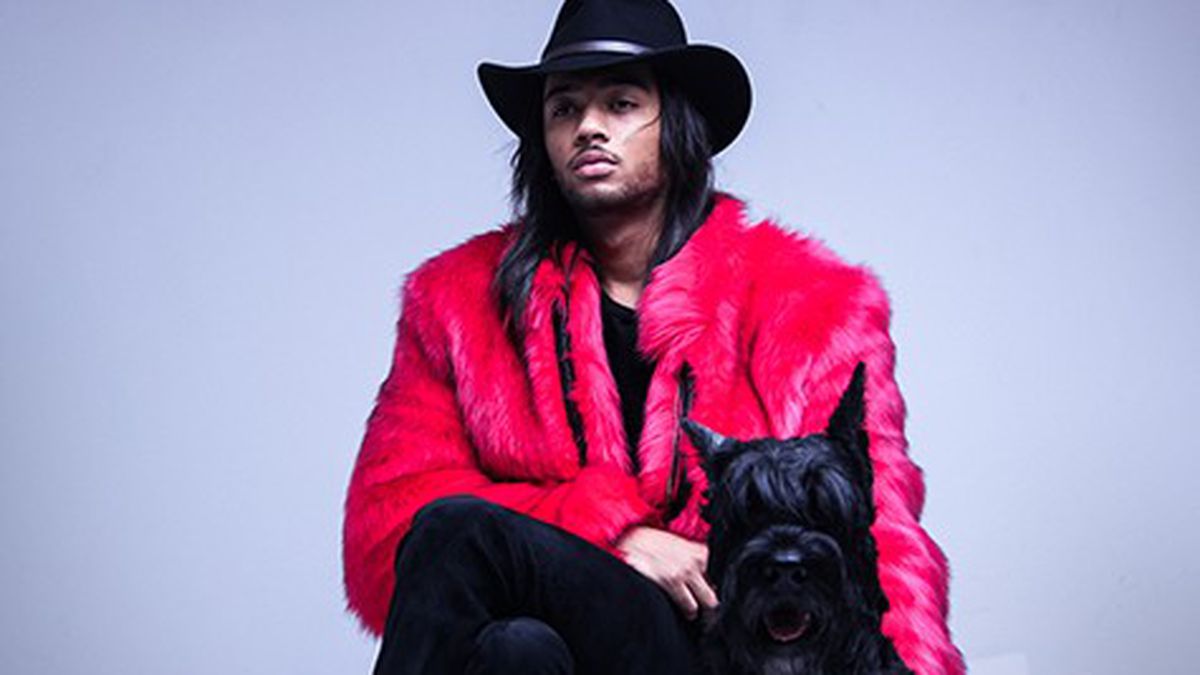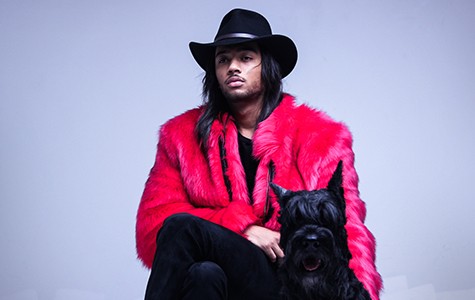In the music video for his new single, “Across the Room,” Berkeley singer Kossisko (Kossisko Konan) dances under laser-beam disco lights, swaying his hips and swishing his mane of flowing hair. In my pocket/I got a picture of pain/So tonight/I’m gonna give my love to a stranger, he sings in his breathy falsetto. The video cuts to Kossisko posing against a white backdrop, bare-chested. He wears a different flashy, designer coat in each shot: red fur, polkadotted silk, and ochre suede. In the context of his recent transformation, dancing alone, without scenery, seems like a deliberate choice to introduce his audience to his new artistic identity.
Before releasing his retro-sounding, seven-track dance pop project, Red White N Cruel, earlier this month, Kossisko was better known as 100s (pronounced “Hunnets”), a rapper with an exaggerated pimp persona. Though his g-funk beats and cocky, flippant lyrics made for fun party music, much of his appeal hinged on shock value. On his previous releases, Ice Cold Perm and Ivry, he took his bad-boy character to the extreme and his punchlines were often raunchy and blatantly misogynistic. While he complicated his lyrical content with humor and hyperbole — to the point that it almost resembled parody — the end result did more to promote regressive gender norms than it did to critique them.
Over the past few years, however, Kossisko began thinking critically about gender and questioning the ways in which society’s definitions of masculinity had restricted his personal self-expression. “I’ve always been super androgynous — that’s just me,” he said in an interview. “But when you’re maneuvering in the world of rap — I don’t like all the lines and shit that prevent people from being who they are.”
As he grew older and more experienced (when he started putting out music as 100s, he was nineteen years old), he realized the casual sexism in his lyrics promoted damaging ideas. “Eventually, it started to fuck with my conscience,” he said. “At times, I would see women’s reactions and they would be appalled, and that wasn’t a good feeling.”
Instead of releasing a new record as 100s that departed from his previous material, Kossisko decided to drop the moniker and stop rapping altogether. Though he had enjoyed considerable success as 100s — with a deal with the influential New York label Fool’s Gold Records and a tour with one-time viral sensation Kreayshawn — he decided to start over and build a new fan base because his new work has almost no continuity, sonically or lyrically, with his previous output. To Kossisko, rap represents a type of masculinity with which he no longer identifies. Even though in recent years many rappers such as Mykki Blanco have used the genre as a medium to break down gender stereotypes, Kossisko said he wanted to reinvent himself using pop as a new form of self-expression.
The tracks on Red White N Cruel have disco roots and occasional inflections of funk, bass, and EDM. Kossisko channels Prince and Michael Jackson with his flamboyant vocal style, and these gender-nonconforming pop giants’ influence is apparent in his eye-catching fashion choices and permed hair. The EP’s production deftly combines nostalgic sounds with contemporary pop, hip-hop, and R&B elements. “Roses” features new wave-tinged synth lines and big, four-to-the-floor drum beats with a distinctly Eighties flavor. The melodramatic saxophone on “Red White N Cruel” evokes the horns on Sade’s “Sweetest Taboo.” While “Last Night” features trap high hats in its beat, its EDM buildup eventually releases into bare, warbly surf guitar chords that cleverly subvert listeners’ expectations of a danceable bass drop. These elements of different genres interspersed throughout the record allow Kossisko to nail down a signature sound that defies easy categorization.
On Red White N Cruel, Kossisko’s lyrics deal with sex and relationships in a much more vulnerable way than his previous work. Throughout the EP, he parses through mercurial feelings about ambiguous liaisons and tenuous connections with intriguing strangers. His brand of melancholic dance music takes after artists such as The Weeknd and Frank Ocean and speaks to the distinctly 21st century experience of feeling alone even though we’re seemingly always connected.
The drastic difference between his projects as Kossisko and 100s attest to the artist’s recent consciousness shift. “I wanted to distance myself [from 100s] so I could give my new shit room to grow and live and be its own thing,” he said. “Also, I didn’t want to force people who liked [100s’] stuff to have to like my new stuff. Artists go through stuff, evolve, and change. And there’s nothing wrong with anyone who likes [100s] — it’s your life, whatever makes you happy, listen to it.”
Kossisko explained that the music he made as 100s was an outlet for his anger during a difficult period in his life. As a punishment for acting up when he was in high school, his father, who is originally from the West African nation of Cote d’Ivoire, sent him away to live with extended family in his native country. Kossisko — who is half white and had no French language skills when he came to Cote d’Ivoire — struggled to blend in with his new surroundings. “I was wearing big-ass basketball shorts and Rocawear. People were looking at me like I was an alien,” he laughed.
His only connection to his old life in Berkeley was through the internet, and in lieu of having a social life, he voraciously consumed new music. He was obsessed with Lil Wayne and Gucci Mane, but also idolized eccentric pop stars such as Lady Gaga. Rapping became a way for him to rebel, but so did expressing his feminine side by growing out and straightening his hair. After returning to Berkeley during his senior year of high school, he started pursuing music seriously. 100s was a necessary phase for him to go through, he reflected, but one that couldn’t last forever.
“When all that shit was made, the reason that it resonates is because I was an angry motherfucker making it. I had issues, and that was my medium,” he said. Radically changing his sound and appearance might seem like a bold and unexpected move, but it’s something Kossisko found necessary in order to stay authentic to who he has become. “I’m not gonna do anything that I don’t connect with. … I’m the type of person that, anytime I put out a body of work, you can expect me to grow. I’m not gonna put out some stock chicken nugget shit.”

















